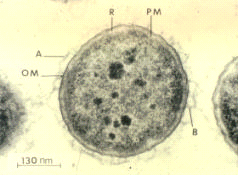
Aeromonas is a genus of Gram-negative, facultative anaerobic, rod-shaped bacteria that morphologically resemble members of the family Enterobacteriaceae. Most of the 14 described species have been associated with human diseases. The most important pathogens are A. hydrophila, A. caviae, and A. veronii biovar sobria. The organisms are ubiquitous in fresh and brackish water.

Aeromonas salmonicida is a pathogenic bacterium that severely impacts salmonid populations and other species. It was first discovered in a Bavarian brown trout hatchery by Emmerich and Weibel in 1894. Aeromonas salmonicida's ability to infect a variety of hosts, multiply, and adapt, make it a prime virulent bacterium. A. salmonicida is an etiological agent for furunculosis, a disease that causes sepsis, haemorrhages, muscle lesions, inflammation of the lower intestine, spleen enlargement, and death in freshwater fish populations. It is found worldwide with the exception of South America. The major route of contamination is poor water quality; however, it can also be associated stress factors such as overcrowding, high temperatures, and trauma. Spawning and smolting fish are prime victims of furunculosis due to their immunocompromised state of being.
Aeromonas allosaccharophila is a Gram-negative, catalase-positive, motile bacterium from the genus Aeromonas which was isolated from ill elvers in Valencia, Spain.
Aeromonas bivalvium is a Gram-negative, oxidase- and catalase-positive, motile bacterium with a polar flagellum of the genus Aeromonas isolated from bivalve molluscs.
Aeromonas caviae is a Gram-negative bacterium of the genus Aeromonas isolated from epizootic guinea pigs.
Aeromonas diversa is a Gram-negative, facultative anaerobic bacterium of the genus Aeromonas isolated from the leg wound of a patient in New Orleans.
Aeromonas encheleia is a Gram-negative, motile bacterium of the genus Aeromonas isolated from European eels in Valencia, Spain.
Aeromonas eucrenophila is a Gram-negative bacterium of the genus Aeromonas isolated from fresh water and infected fish. A. eucrenophila is a pathogen of fish, and it causes diarrhoea in humans.
Aeromonas fluvialis is a Gram-negative, oxidase- and catalase-positive, facultatively anaerobic, non-spore-forming bacterium of the genus Aeromonas isolated from water from the Muga River in Girona in northeastern Spain.
Aeromonas jandaei is a Gram-negative bacterium of the genus Aeromonas isolated from human feces in Oregon.
Aeromonas molluscorum is a Gram-negative, oxidase- and catalase-positive, motile bacterium with a polar flagellum of the genus Aeromonas which was isolated from bivalve molluscs.
Aeromonas piscicola is a Gram-negative, catalase and oxidase-positive bacterium of the genus Aeromonas isolated from diseased fish in Spain
Aeromonas popoffii is a Gram-negative bacterium of the genus Aeromonas isolated from drinking water production plants and reservoirs in Oelegem, Belgium, and in Scotland.
Aeromonas rivuli is a Gram-negative, oxidase- and catalase-positive, non-spore-forming bacterium with a polar flagellum of the genus Aeromonas isolated from Westerhöfer Bach in Harz in Germany.
Aeromonas sanarellii is a Gram-negative, oxidase- and catalase-positive, non-spore-forming bacterium of the genus Aeromonas isolated from wounds of patients in a hospital in Taiwan.
Aeromonas simiae is a Gram-negative, oxidase- and catalase-positive motile bacterium of the genus Aeromonas, with a polar flagellum, isolated from the faeces of a healthy monkey.
Aeromonas taiwanensis is a Gram-negative, oxidase- and catalase-positive, non-spore-forming, motile bacterium of the genus Aeromonas isolated from wounds of patients in Taiwan.
Aeromonas tecta is a Gram-negative bacterium of the genus Aeromonas isolated from stool of a child with diarrhoea, a healthy patient, and environmental sources.
Aeromonas aquatica is a bacterium from the genus Aeromonas which has been isolated from a humic lake in Haukkajärvi in Finland.
Aeromonas lacus is a bacterium from the genus Aeromonas which has been isolated from a humic lake in Huutjärvi in Finland.

